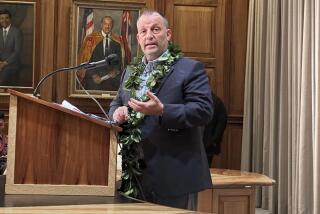DATELINE: HONOLULU : First Hawaiians Seek Return to Some Sovereignty : Few want to revert to a monarchy. But many seek self-determination such as American Indians have.
- Share via
Turn on the radio these days in Hawaii and you are less likely to hear “Tiny Bubbles” than local musicians belting out a “Song of Sovereignty.”
Another new hit on all-Hawaiian music stations laments the endless wait of one indigenous Hawaiian for his own land and urges listeners to “look to the source, to a new nation.”
As the centennial of the overthrow of Hawaii’s monarchy approaches, a push by Hawaiians to reclaim at least part of their lost nation is picking up momentum--and permeating the airwaves.
“For many, many years, people who spoke about sovereignty were viewed as being political crazies, anarchists and terrorists. That’s no longer true today,” said attorney Mililani Trask, a leader among the original Hawaiians, who are nearly a fifth of Hawaii’s population.
It has been nearly 100 years since businessmen backed by U.S. troops deposed Hawaii’s queen, Liliuokalani, and imprisoned her at Iolani Palace. That coup, in January, 1893, was designed to prevent the queen from promulgating a new constitution at the expense of pro-American interests. It usurped an internationally recognized government and set the stage for annexation and eventual statehood for the islands.
Some indigenous Hawaiians have not forgotten it, and their bitterness lingers.
Last month, 32 people were arrested for trespassing when a group of Hawaiians marched up the steps of Iolani Palace, now a museum, in a symbolic protest. They have vowed to return to press their demands for autonomy.
Today, only a fraction of indigenous Hawaiians advocates trying to turn back the clock by seceding from the United States, expelling Americans and restoring the monarchy.
“We’re political realists,” Trask says. “We’re not going to kick out everybody who’s non-Hawaiian. My God, we’ve married half of them.”
But many Hawaiians are serious about winning some form of self-determination, at least along the lines exercised by American Indians and Aleuts, who have nation-within-a-nation status. The original Hawaiians are the only indigenous people in the 50 states who lack such federal recognition, Trask said.
Hawaiian efforts to gain such status have been stymied by infighting among many groups, but the impending anniversary seems to be providing an impetus for unity. Fifty organizations recently banded together to educate Hawaiians about sovereignty options.
Although definitions vary, most people agree that key elements of sovereignty are formal recognition of Hawaiians as a unique people, formation of a native government, compensation for historical wrongs and creation of a land base. Steps toward these goals include:
* U.S. Sen. Daniel K. Inouye (D-Hawaii) is circulating draft legislation to “authorize the reorganization of a native Hawaiian government” within the framework of U.S. laws.
* The Office of Hawaiian Affairs, a semi-autonomous state agency, has sent a “blueprint for sovereignty” to Congress, asking for the return of more than 1 million acres of land taken at annexation and $10 billion in compensation.
* More than 10,000 people have signed on as citizens of Ka Lahui (The Nation), an initiative for self-government.
* A federal panel, the Hawaii Advisory Committee to the U.S. Commission on Civil Rights, recently endorsed Hawaiian “sovereignty and self-determination” and criticized the government for violating the civil rights of Hawaiians.
Since the overthrow of the queen, the socioeconomic status of Hawaiians has plummeted. Once a remarkably healthy people, their mortality rate today is nearly a third higher than the average American’s. Most of the 187,000 acres of land set aside for them by Congress in 1921 has been leased to non-Hawaiians or taken by government agencies.
“Many of us who are committed to the Hawaiian movement are motivated by wanting to reform and change a system which keeps our people at the bottom,” said Mahealani Kamauu, executive director of the Native Hawaiian Legal Corp. “Sovereignty and the ability to control our own destiny offers that hope.”
Claiming their share, however, will not be easy. The Bush Administration has denied federal responsibility for Hawaiians. Although Congress has appropriated some funds for Hawaiian health and education, it is an open question how the idea of a new nation will be received.
More to Read
Sign up for Essential California
The most important California stories and recommendations in your inbox every morning.
You may occasionally receive promotional content from the Los Angeles Times.












